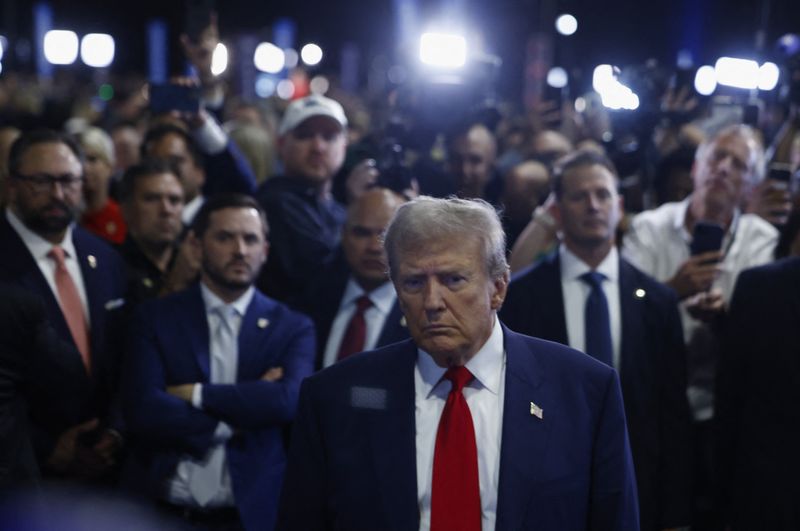By Bansari Mayur Kamdar
(Reuters) - A tight U.S. presidential election race has unnerved investors in emerging markets, who fear a return of former President Donald Trump to the White House could hurt emerging markets just as they were poised to shine.
The prospect of lower interest rates in the United States has brightened the outlook for EM assets, which have lagged their developed peers in the last few years.
But analysts are now concerned that under a second Trump presidency trade barriers could be buttressed, spurring a rebound in inflation and thereby interest rates, lifting the dollar and eventually weighing on emerging markets again.
"Normally this would be a good macro backdrop for emerging markets: resilient growth, continued disinflation and a weak dollar," Arun Sai, senior multiasset strategist at Pictet Asset Management, told the Reuters Global Markets Forum (GMF).
"But we have two issues to contend with," Sai said - China remains a drag on the global economy, and then there is the threat of stronger tariffs and disruptions to world trade.
"EM will bear the brunt," he said.
Trump has said he would consider 60% tariffs on Chinese exports, a move Barclays' economists estimate could knock two percentage points off China's GDP in the first 12 months.
For other U.S. trading partners, a far lower 10% universal tariff has been proposed.
Such tariff levels could slash U.S.-China bilateral trade by 70% and lead to hundreds of billions of dollars' worth of trade being eliminated or redirected, Oxford Economics noted.
Investors have found it difficult to say when China's economy will turn the corner, Straits Investment Management CEO Manish Bhargava said.
"EM risk should come with a premium, but that's not happening ... India is good but expensive, China is cheap but has its own problems."
In their first face-to-face debate, Democratic candidate Kamala Harris likened Trump's tariff plan to a sales tax on the middle class. Nonetheless her campaign supports Biden-era tariffs, even signalling "targeted and strategic tariffs" in the future.
"A Harris administration would likely keep using tariffs too, but she would prefer to use them along with other tools like investment in clean energy sectors," said Rachel Ziemba, founder of advisory firm Ziemba Insights.
SILVER LINING
Trump's new proposed tariffs could be set lower than the threatened levels, for China and other trading partners, noted Mark Haefele, CIO of UBS Global Wealth Management.
On the other hand, Washington's push for "friendshoring" - replacing China's role in supply chains with friendly nations - could boost U.S.-aligned EMs.
India and key Southeast Asian economies such as Indonesia and Malaysia could benefit if supply chain diversification accelerates again, Haefele said.
"India is the best structural story in EM based on four pillars," Malcolm Dorson, senior portfolio manager and head of EM strategy at Global X ETFs told GMF.

Working in India's favour are attractive demographics, the potential for long-term growth, a market-friendly government, and "being in the right place at the right time" to benefit from the China+1 trade, Dorson said.
(Join GMF on LSEG Messenger for live interviews: )